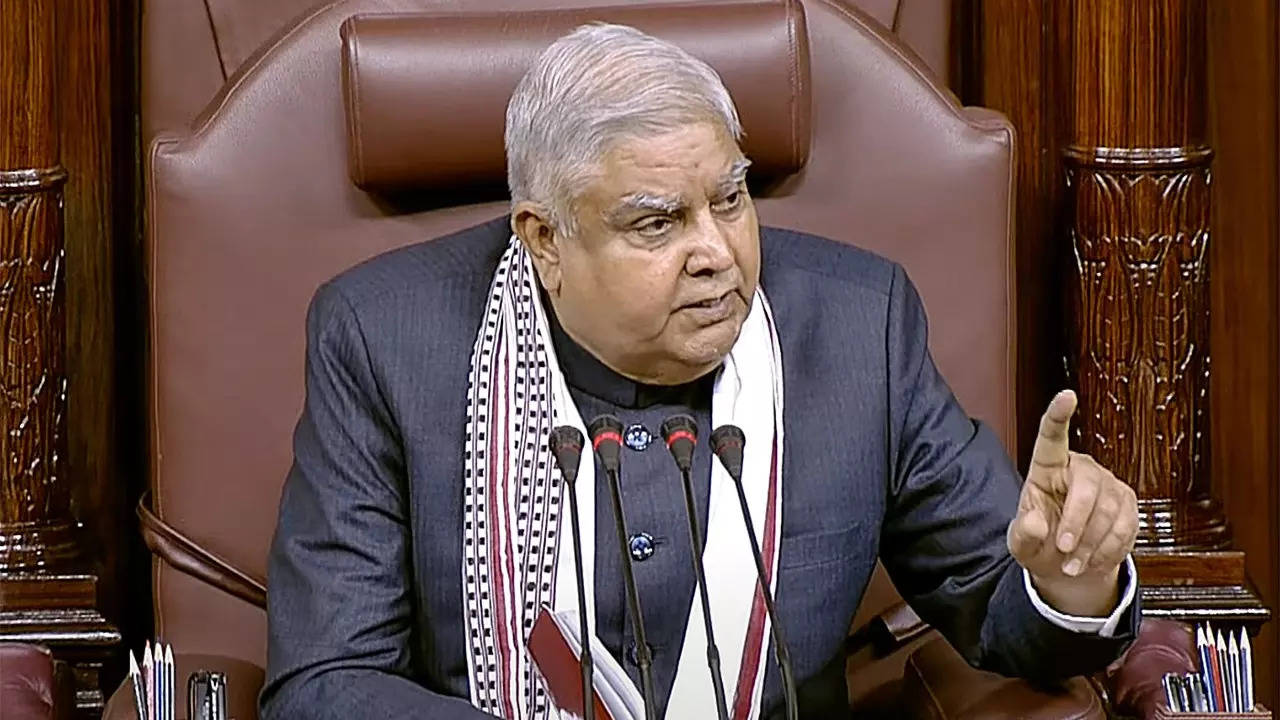
NEW DELHI: Parliament adjourned sine die on Friday with the winter session coming to an end six days ahead of schedule. It was also vice-president Jagdeep Dhankhar’s maiden session as chairperson of the Rajya Sabha. While Dhankhar presided over the Upper House which recorded 102 per cent productivity, his remarks on the judiciary, Congress leader Sonia Gandhi and disruption of business were also notable developments.
After defeating Margaret Alva of the Congress, Dhankhar took over as the 14th vice-president of India and ex-officio chairperson of the Rajya Sabha on August 11, succeeding M Venkaiah Naidu.
Dhankhar is only the sixth vice-president to have served as governor earlier. He was the West Bengal governor till he was nominated by the BJP-led NDA to contest the vice-presidential election. Zakir Hussain, Gopal Swarup Pathak, BD Jatti, Shankar Dayal Sharma and Krishan Kant also were governors before they took over as vice-president.
Of the 13 vice-presidents before Dhankhar, only four (Zakir Hussain, Gopal Swarup Pathak, Bhairon Singh Shekhawat and M Venkaiah Naidu) had served as Rajya Sabha MPs before becoming the ex-officio chairperson of the Upper House. Dhankhar was a Lok Sabha MP between 1989 and 1991 from Jhunjhunu in Rajasthan.
Dhankhar is the only vice-president nominated by the BJP who was never a Rajya Sabha MP. Both Bhairon Singh Shekhawat and M Venkaiah Naidu were MPs of the Upper House before becoming its ex-officio chairperson.
Of the three vice-presidents nominated by the BJP, Dhankhar is the second from Rajasthan. Shekhawat was also from Rajasthan while M Venkaiah Naidu is from Andhra Pradesh.
In his valedictory remarks on the conclusion of the 258th session of Rajya Sabha, Dhankhar said it had been a learning and enriching experience.
In the 13 sittings since December 7, Rajya Sabha’s productivity was 102 per cent. It functioned for 64 hours and 50 minutes against the total scheduled time of 63 hours and 26 minutes.
However, vice-president Dhankhar’s first session as Rajya Sabha chairperson will also be remembered for three other issues.
1. Remarks on judiciary
The vice-president, in his maiden speech in the Rajya Sabha on December 7, made some comments on the judiciary for striking down the National Judicial Appointments Commission (NJAC).
Dhankhar said, “Essence of democracy lies in the prevalence of the ordainment of the people reflected through a legitimised platform. In any democracy, parliamentary sovereignty is inviolable. We all here are under oath to preserve it.”
He said Parliament, in a much needed historic step, passed the 99th Constitutional Amendment Bill paving way for NJAC.
He said there was unprecedented support for NJAC. On August 13, 2014, Lok Sabha unanimously voted in its favour with there being no abstention. Rajya Sabha too, passed it unanimously on August 14, 2014 with one abstention. After 16 of the 29 states ratified the central legislation, the president of India under Article 111 accorded his consent on December 31, 2014.
Dhankhar lamented that the whole exercise was undone by the Supreme Court. “This historic parliamentary mandate was undone by the Supreme Court on October 16, 2015 by a majority of 4:1 finding the same as not being in consonance with the judicially evolved doctrine of 'Basic Structure' of the Constitution.”
Taking exception to the rejection of NJAC by the apex court, Dhankhar said, “There is no parallel to such a development in democratic history where a duly legitimised constitutional prescription has been judicially undone. A glaring instance of severe compromise of parliamentary sovereignty and disregard of the mandate of the people of which this house and the Lok Sabha are custodians.”
Dhankhar, who himself was a lawyer, said, “We need to bear in mind that in democratic governance basic of any 'Basic Structure' is the prevalence of primacy of the mandate of the people reflected in the Parliament. Parliament is the exclusive and ultimate determinative of the architecture of the Constitution.”
He regretted that there has been no focus in the Parliament on the issue for over seven years now. “This House, in concert with Lok Sabha, being custodian of the ordainment of the people, is duty bound to address the issue, and I am sure it will do so,” he said.
2. Comments on Sonia Gandhi
UPA chairperson Sonia Gandhi took exception to Dhankhar’s comments on the judiciary.
In her address to the Congress Parliamentary Party (CPP) on December 21, she said, “A troubling new development is the calculated attempt underway to delegitimise the judiciary.”
Without naming Dhankhar, Sonia said, “Ministers – and even a high constitutional authority – have been enlisted to make speeches attacking the judiciary on various grounds. It is quite clear that this is not an effort to provide reasonable suggestions for improvement. Rather, it is an effort to reduce the standing of the judiciary in the eyes of the public.”
The vice-president objected to Sonia’s remarks. In a strong reaction, he said, “The observations are severely inappropriate, indicating lack of faith in democracy, making this exceptional response unavoidable.”
He further said, “The statement imparted by the Hon’ble Chairperson of the UPA is far distanced from my reflections. Delegitimising the judiciary is beyond my contemplation. It is a pillar of democracy. I would urge and expect leaders across the political spectrum to bear in mind not to subject high constitutional offices to partisan stances.”
3. Disruption of house
From time-to-time, Dhankhar pulled up Rajya Sabha MPs for ruckus and pandemonium in the house.
On the last day of winter session, he said, “Disruption, resulting in loss of precious time of 1 hour 46 minutes and exhibition of unacceptable conduct, plagued the proceeding in some measure.”
He said disruption as an expression mechanism was antithetical to grace, decorum and sublimity of the Rajya Sabha as a solemn platform. “The fallout is invariably negative as it generates disillusionment, disappointment, helplessness and hopelessness in the people.”
He appealed to all the MPs to “deeply reflect” and seek a “reality check” of the people on their performance.







